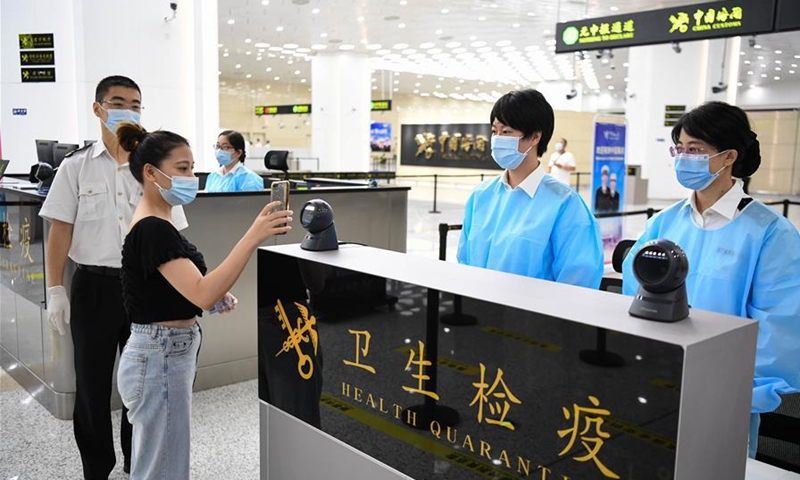China pushes test-based health code, eyes global mechanism
By Li Qiaoyi and Zhang Han Source: Global Times Published: 2020/11/26 20:23:41

A passenger (2nd R) shows her health QR code to health quarantine staff at Hengqin Port on Aug. 18, 2020. The new port to facilitate travel between Macao and Zhuhai, south China's Guangdong Province, was officially put into use Tuesday, a new step to boost development of the Guangdong-Hong Kong-Macao Greater Bay Area. (Xinhua/Deng Hua)
More Chinese embassies have joined the push for pre-departure health codes based on coronavirus nucleic acid and antibody tests, a prerequisite for China-bound travels, which can shed light on how a global mechanism for mutual health code recognition will look like.
In a notice on its website on Thursday, the Chinese Embassy in Canada announced that Chinese and foreign passengers flying directly from Canada to China should take nucleic acid and IgM anti-body tests within two days before departure starting December 1.
The specimen need to be collected in Canada and passengers are required to request a QR code with an HS mark (applicable to Chinese) or HDC mark (applicable to foreigners) with the Chinese Embassy or Consulate General in Canada based on two negative certificates, also within two days before departure, the notice said. The practice of presenting test results prior to boarding will be discontinued.
Also on Thursday, the Chinese Embassy in South Korea issued a similar notice, requesting China-bound passengers to apply for a green QR code based on a similar requirement.
The announcements came after previous announcements by Chinese embassies in the US and France that both set December 1 as the beginning of new rules for China-bound passengers.
In all these cases, Chinese passengers can file for the green health code through the WeChat Health Code app, while foreign passengers are required to log into a website for a health declaration certificate. The passengers need to fill in their information, upload negative test certificates and other documents, which will then be reviewed and verified by the embassies or consulates, the Global Times learned.
With more Chinese embassies joining the test-centered health code push that offers a plausible yet convincing approach to ensure safe international travel, it seems that the China-proposed global mechanism for mutually recognized health codes is taking shape, observers said.
The establishment of such an international mechanism was proposed by the Chinese leadership at the 15th G20 Leaders' Summit earlier this month.
The green health code as a prerequisite for flight boarding "sounds like a good plan," and if the approach to secure international travel is globally recognized, meaning legally binding technical cooperation protocols between China and other countries, a global mechanism for mutual health code recognition will be out there, Liu Dingding, a Beijing-based internet market watcher, told the Global Times on Thursday.
Besides concerns on privacy and coordination challenges of the system itself, some experts also noted that medical institutions and hospitals issuing test results must be credible to guarantee the smooth operation of such a system based not only on technology but also on mutual trust.
The system will resume international exchanges while ensuring public health, said Bai Ming, deputy director of the Ministry of Commerce's International Market Research Institute, stressing that an inaccurate negative result will mislead receiving countries and hinder the curb of the virus.
A public administration expert who requested anonymity, told the Global Times that operating such a system within a country requires administrative resources, citing the early period when different provincial regions had different codes.
"Building a global code system would be much more difficult than that, and China, which has successfully established such a system to emerge from the virus, is willing to share its experiences to accelerate the resumption of global personnel and goods exchanges," the expert said, noting that on top of technical details, mutual trust is essential to make the first step.
The mechanism could get initial trials in neighboring countries and countries that have "green lanes" or fast lanes for travel with China during the pandemic, such as South Korea and Japan, experts said.
RELATED ARTICLES:
Posted in: SOCIETY,CHINA FOCUS